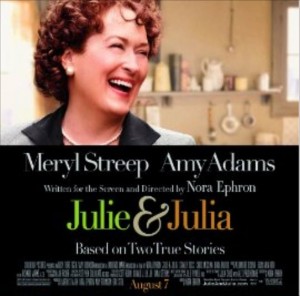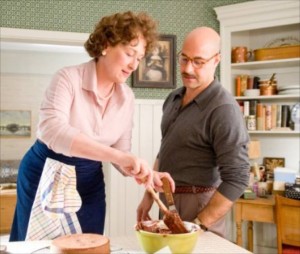We went to see Julie and Julia, Nora Ephron’s film about two women obsessed with French cuisine. It’s based on a true story about Julie Powell (played by a waiflike Amy Adams), a lost young wife living in Queens in 2002 who fastens on Julia Child’s famous cookbook, Mastering the Art of French Cooking, as a way of giving purpose to her life. She decides that she will cook every recipe in the book (all 524 of them) in a single year — and write a blog about the experience.
Ephron’s screenplay weaves the lives of the two women — who never meet — into a charming tale. Julia Child is played by Meryl Streep in a performance that initially seems so over the top that one is reminded of the Monty Python portrayal of Mrs Jean-Paul Sartre. David Denby put it nicely in his New Yorker review: “Like a tall ship at full sail, she leans, tilts, and billows. Odd explosions of air—whoops, exclamations—come hurtling through the passageways. She runs out of breath, and then settles, mysteriously, like an old Bible that italicizes ordinary words, on a single syllable.” The effect is slightly off-putting at first, but it’s such a focussed performance that eventually one begins to wonder: maybe Child really was like this. After all, Streep is a great actress and she must know what she’s doing. Besides, the real-life Child was a very large woman (six foot two in height and with a presence to match). So I suspended disbelief and resolved to check it further when I got home.
At the artistic heart of the film is a conjecture: that cooking can change your life. Julia Child was the wife of Paul Child, a civilised and urbane minor US diplomat (played by Stanley Tucci) who is posted to Paris in 1948, just as Senator Joe McCarthy is beginning to stoke anti-Communist hysteria back home. She loved Paris and French food, but was lost for something to do (the couple had no children) and so eventually fastened on the idea of enrolling at the Le Cordon Bleu cookery school. After many twists and turns (nicely portrayed in the film and including Paul’s skirmish with McCarthyism) she wound up writing the book that introduced the American thinking classes to the glories of French cuisine. In a way, she was the Americans’ answer to Elizabeth David — except that Child was less fastidious as a person and took to TV like Fanny Craddock (and became just as famous). But, overall, it was an obsession with the details of haute cuisine that gave meaning to her life.
Half a century later, Julie Powell is drifting through life in New York. Married to a civilised, urbane magazine editor (nicely played by Chris Messina), she works by day in the office of a government organisation set up to deal with relatives of the victims of 9/11. The only thing she really seems to enjoy doing in cooking. She wants to be a writer (even wrote “half a novel” once) but is getting nowhere. Eventually she finds that one of her ghastly, power-dressing contemporaries has started a blog about her personal life which is going to be turned into a TV mini-series, and has the thought: I could write a blog too! But about what?
And therein hangs the tale. Julie starts a blog (using the old Userland software which powered Salon blogs and that I used to use before I switched to WordPress). Initially, nobody notices it (she’s a long way down the long tail), but eventually it gets some traction and one day the New York Times discovers it and — Hey Presto! — Julie’s on her way to fame and a book deal — and personal salvation. It isn’t all plain sailing, of course: she has reverses and crises (just as Child had) on the way; and even if she hadn’t, the dramatic demands of a screenplay would have necessitated them. But the story ends, satisfyingly, with the realisation that both women Came Through. And left the world a better place. And so we walked out into the twilight with the warm glow that comes from realising that Boeuf Bourgignon can change your life. (Which in my case, incidentally, it did. But that’s another story.)
But back to my original discombobulating concern: was Streep taking us for a ride? In the old days, we’d have no way of checking. Now, though, we have YouTube. So here’s a link to the trailer for the film. And here is the real Child on how to make an omelette:
And my conclusion? Streep did over-egg the pudding a bit. Or, as the French would say, un peu. Put it down to artistic licence; after all, you can’t make an omelette without breaking some eggheads.
FOOTNOTE: Julia Child’s recipe for Boeuf Bourgignon (pdf) available from here. I’m afraid I disagree with her about the bacon rinds. Otherwise she’s spot on.



